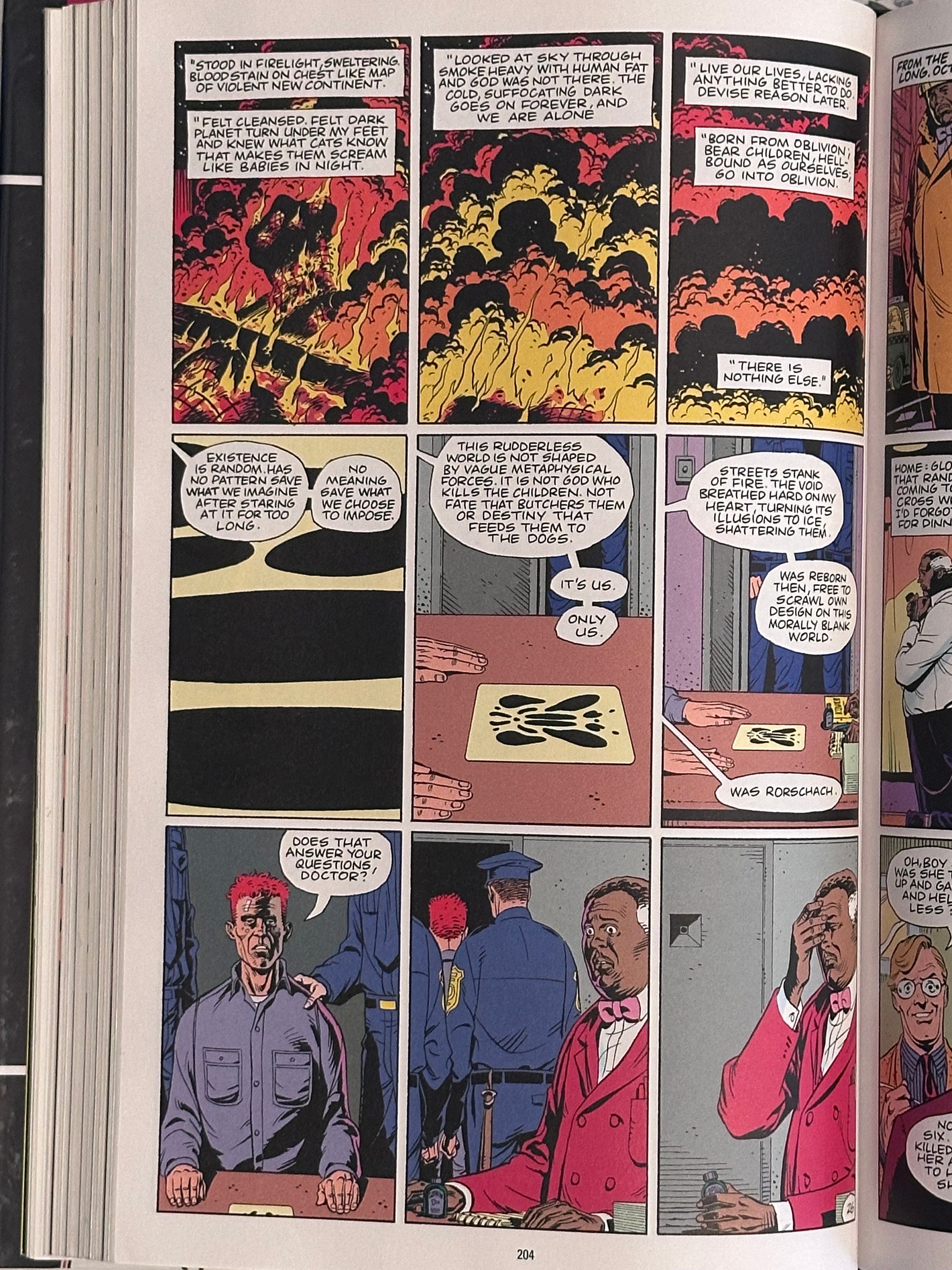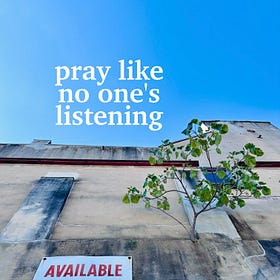Teaching Nihilism in Sunday School, Part II: Nihilism via comics
Middle Schoolers can handle it. They got that darkness in them.
I’m actually teaching Sunday School to middle schoolers (6th-8th grades; 11-13 year olds) at a Christian church.
I’m actually doing a lesson on nihilism.
This is the second in a three-part series:
1. Why am I teaching Sunday School?
2. Nihilism via comics (this post!)
3. Pray like no one’s listening
This post contains the first half of my lesson plan, where I actually introduce nihilism. I’m sharing it here, on the Scientific Animism Substack, because I think this might be where the overlap is, in my Venn Diagram of Christianity and Scientific Animism. They overlap in the absence; in the doubt; in an area that is more a part of Christianity’s shadow than its intent.
Alright, so, the lesson
Starting song: All Circles, by mewithoutYou
All circles presuppose they’ll end where they begin,
but only in their leaving can they ever come back around.
go ahead and leave, if you want to leave
doubt, if you can’t muster faith
if you never leave because you assume you’ll circle back around later anyhow, then you’ll never become a circle, you’ll just be a point
maybe you’ll circle back around
maybe you’ll be some other shape
maybe a helix
definition, plz
When most people think about nihilism, I think they think of something like the ending to this SMBC (it’s a slow descent into nihilism, through a bunch of silliness):
There is no ending because there is no such thing as a “story.” There’s just stuff that happens, and that stuff was considered to “have meaning” in the mind of a short-lived species of ape.
This is quintessential nihilism. All about negation. “There’s no [x],” where [x] is some concept that is popularly considered to exist. Meaning, purpose, pattern, intelligibility. Humans are not special, we are apes. Our whole species will be short-lived and meaningless. Even stories don’t exist; they’re just a figment of human projection.
Now that we’ve been eased down into this darkness, let’s wallow a bit, shall we? Let’s stumble. Let’s explore. The next comic I want to look at comes from Watchmen. Watchmen is a Very Cold War comic book from the 1980s, when nuclear annihilation seemed to loom around every corner. It follows a few different “superheroes” who, in this story, are just vigilantes (aka self-appointed crime fighters with no oversight) dressed in ridiculous costumes (Alan Moore, the author, originally wanted to use actual superheroes from the DC Comics universe, but the publishers wouldn’t let him!). The “watchmen”, these vigilantes are sometimes called. “Who watches the watchmen?” the book likes to ask, because most of them are petty and vindictive. Like Rorschach, the character who speaks the words on the page we’re about to read. The scene that follows comes right after he ties an abuser in a building and then lights the building on fire. (Blockquote of the passage follows the picture, if you have trouble reading the words in the image.)
Stood in firelight, sweltering.
Blood stain on chest like map
of violent new continent.Felt cleansed. Felt dark
planet turn under my feet
and knew what cats know
that makes them scream
like babies in night.Looked at sky through
smoke heavy with human fat
and god was not there. The
cold, suffocating dark
goes on forever, and
we are alone.Live our lives, lacking
anything better to do.
Devise reason later.Born from oblivion,
bear children, hell-
bound as ourselves,
go into oblivion.Existence is random. Has no pattern, save what we imagine after staring at it for too long.
No meaning save what we choose to impose.
This rudderless world is not shaped by vague metaphysical forces. It is not God who kills the children. Not fate that butchers them or destiny that feeds them to the dogs.
It’s us.
Only us.
Streets stank of fire. The void breathed hard on my heart, turning its illusions to ice, shattering them.
Was reborn then, free to scrawl own design on this morally blank world.
whoa that was heavy
well,
look,
i know these are ideas you’ve already thought about, or heard about. if you haven’t yet, you will soon. i want you to have a label when you come across them. ideas feel less confusing, or threatening, when there’s a folder to put them in. and now that you’ve seen Rorschach, no other nihilism can surprise you. that’s as dark as the knob can go.
also, i need you to know something:
there is room for all of your darkness.
there is room for all of your doubt.
whatever god is, it is not offended if you do not believe in it.
i’m not offended by whatever you’re carrying, or whatever you can no longer carry.
the people here, in this community, are not offended.
in fact, i would say,
we need your darkness
like we need your light.
go ahead. go there. explore.
or if it doesn’t feel like exploration;
if instead it feels like suffocation,
we’re here to talk to.
i’m here to talk to.
we’ve been through it, too,
we might be in it right now,
we’ll walk,
we’ll sit
beside you.
don’t suffer alone.

i’ve started to think of nihilism as a mood
sometimes one that lasts for years.
even the psalmist felt it.
My God, my God, why have you forsaken me?
Why are you so far from saving me, from the words of my groaning?
O my God, I cry by day, but you do not answer,
and by night, but I find no rest.and sure, maybe that’s not “real nihilism,” but probably neither is a bunch of stuff that i think of as nihilist. note my lack of formal definitions here. but, sure, if we’re getting pedantic, let’s talk about
different kinds of nihilism
From Wikipedia’s list:
Existential Nihilism: life has no intrinsic meaning or value; the whole of humanity, let alone any specific individual, is insignificant and without purpose. This is the kind of nihilism most people talk about when they talk about nihilism. “Meaning exists only in the mind of a short-lived species of ape.”
Cosmic Nihilism: the universe is not some benevolent stand-in for God; the universe is chaotic, unintelligible, and indifferent or even hostile to all life, specifically human life. This hits pretty hard for me, though I’ve seen even secular arguments against.
Moral/Ethical Nihilism: no morality/ethics exists whatsoever; no action is preferable to any other. Rorschach mixes this with his existential nihilism.
Epistemological Nihilism: knowledge either does not exist or is unattainable. Maybe I’m not grasping the nuance here, but this seems self-evidently false to me? Just look at the march of technology in your own lifetime—the scientific method works; it continues; humanity be learning; humanity be knowing. ¯\_(ツ)_/¯
Political Nihilism: no political goals aside from destruction. I see this as a big cause of our recent election. As someone who leans pretty anarchist, can I just say: I hate this kind of nihilism. Look at any toddler: destroying things is easy; building is hard. Fuck the nihilists; I still believe in hope. (Not sure I’ll actually say “fuck” in front of my middle schoolers; two of them told me they’re into Eminem but another is quite offended by swear words!)
Then there are even more esoteric forms of nihilism. “Concrete objects do not exist”??? Ok, philosophy departments, we see you. Very cute.
hey, a philosophy is not a mood
Right. I said I think of nihilism as a mood. And then you objected because I said King David was feeling nihilistic in that psalm.
Ok, so maybe the philosophical position of nihilism is not a mood, but your reaction to it is. You have a choice of how to hold it. Even if the beliefs, or lack thereof, feel inescapable to you, you don’t have to be like Rorschach about it.
In fact, you’re not supposed to like Rorschach. He claims that the universe is a morally blank canvas, yet he moralizes constantly. He’s all bothered by people enjoying the “wrong” kinds of pleasure. And he inflicts horrifying pain on other people, in a vengeful, hateful pursuit of a twisted “justice.” I’d much rather be like Beret Guy in this xkcd:
Even another character in Watchmen, Dr. Manhattan, starts off arguing that (human) life is no more remarkable than rocks (specifically, the rock formations of Mars, where the next scene takes place), but eventually comes around to the following conclusion (again, if reading the text in the comic is hard, the text is all copied to a blockquote below):
Laurie: Listen, you’ve just been saying life IS meaningless, so how can… ?
Dr. Manhattan: I changed my mind.
Laurie: But why?
Dr. Manhattan: Thermodynamic miracles… events with odds against so astronomical they’re effectively impossible, like oxygen simultaneously becoming gold. I long to observe such a thing.
And yet, in each human coupling, a thousand million sperm vie for a single egg. Multiply those odds by countless generations, against the odds of your ancestors being alive; meeting; siring this precise son; that exact daughter.
Until your mother loves a man she has every reason to hate, and of that union, of the thousand million semen competing for fertilization, it was you, only you, that emerged.
To distill so specific a form from that chaos of improbability, like turning air to gold…that is the crowning unlikelihood. The thermodynamic miracle.
Laurie: But… if me, my birth, if that’s a thermodynamic miracle… I mean, you could say that about anybody in the world.
Dr. Manhattan: Yes. Anybody in the world. …But the world is so full of people, so crowded with these miracles that they become commonplace, and we forget… I forget.
We gaze continually at the world and it grows dull in our perceptions. Yet seen from another vantage point, as if new, it may still take the breath away.
Come… dry your eyes, for you are life, rarer than a quark and unpredictable beyond the dreams of Heisenberg; the clay in which the forces that shape all things leave their fingerprints most clearly.
This is like what Mosscap the robot says in A Psalm for the Wild-Built:
Do you not find consciousness alone to be the most exhilarating thing? Here we are, in this incomprehensibly large universe, on this one tiny… incidental planet, and in all the time this entire scenario has existed, every component has been recycled over and over and over again into infinitely incredible configurations, and sometimes, those configurations are special enough to be able to see the world around them. You and I—we’re just atoms that arranged themselves the right way, and we can understand that about ourselves. Is that not amazing?
Or Frank May in Ministry For The Future:
In a high meadow, wild bighorn sheep. Their lambs gambol. When you see that gamboling with your own eyes, you'll know something you didn't know before. What will you know? Hard to say, but something like this: whether life means anything or not, joy is real. Life lives, life is living.
Doesn’t it feel delightfully punk rock, to shrug at nihilism? “Yeah, maybe, so what?”
If you want a name for this variant of nihilism, some people have offered “Optimistic Nihilism.”
Next up, if you’re in a period of doubt, then you’re probably feeling skeptical of various spiritual practices, like prayer.
Teaching Nihilism in Sunday School, Part III: Pray like no one's listening
How do you pray, if you don’t think there’s a god on the other end of the line? Is there a way to pray like no one is listening? I think so!








"whatever god is, it is not offended if you do not believe in it."
I unexpectedly cried.
This is really beautiful. I love how you frame scientific animism, or simply doubt, as Christianity’s shadow. I think that is the thread of belonging I feel toward the Christian world, and why I’m obsessed with border play. I just think it’s fascinating that Christianity has this shadow space, and there’s so much beauty and creativity and kindness there—it’s like a space where my Christianity can finally become what it had always yearned to be—but it’s also a place that is exiled and perceived as threat by Christianity’s core. Anyway, I love the invitation you are extending to these kids. I felt my teenage self drawn to the warmth of a community that can hold the darkness.